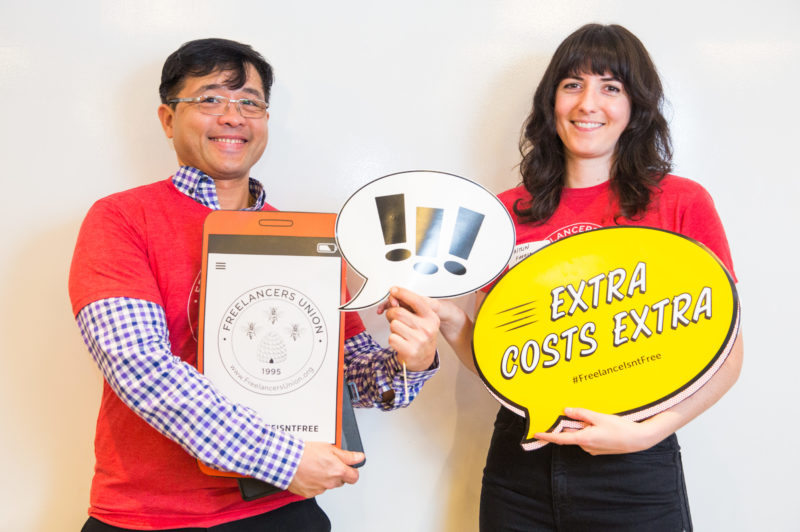5 Ways for Freelancers to Make Sure They Get Paid
We asked the director of the Brooklyn-based Freelancers Union for advice on bringing home those elusive checks
Freelancers Union executive director Caitlin Pearce, right, with union member Randy Gener (Photo courtesy of Freelancers Union)
Working as a freelancer comes with a unique set of perks and challenges that full-time employees don’t experience. Upsides include the ability to choose your own hours, your own workspace, your own projects. What’s not to like? Well, the major downside, which is the struggle to get paid in a timely way–or get paid at all. That chronic problem was brought home earlier this month by a Gothamist story that reported a litany of complaints from freelancers about laggard payments from Brooklyn’s Northside Media, publisher of Brooklyn magazine and producer of the Northside Festival.
Brooklyn freelancers, however, have ready access to two locally-grown resources that can help them. One is the Freelancers Union, which provides advocacy and benefits for more than 375,000 members. The other is the city’s Freelance Isn’t Free Act, a first-of-its-kind-law which went into effect last year to provide legal protections for freelancers, as well as penalties of up to $25,000 for employers who violate the law.
Both the union and the law address a serious issue. “We found that 71% of our members said that at some point they had issues getting paid by a client,” says Caitlin Pearce, the union’s executive director. On average, the members with payment problems were owed $6,000.
Until the law was passed, freelancers had little recourse besides going to small-claims court. Now, however, “hiring parties working with freelancers for over $800 must use a contract. And if they don’t pay their freelancers within either 30 days or whatever date is stipulated in the contract, then they face penalties,” says Pearce.
But freelancers can look out for themselves, too, by following certain procedures that help insure they get paid. Pearce offered these five points of advice:
1. Vet your clients
It’s always important to know who you’re working for. One way that freelancers can find out about who’s hiring them is by talking to other freelancers. “Before you take on work, try to find out what you can from other freelancers who have worked for them,” says Pearce, “and what you can understand about their funding and their reputation. It’s just a small world in the freelance world.”
2. Have a good contract
A contract with clear terms is something Pearce swears by. “Have a good contract that’s really a template that you can customize and use with all of your clients. That way you know what’s in it and you can have a good starting point for negotiating the agreements and make sure that a client does use a contract. And you can remind them now that it’s the law,” she says.
3. Create a good invoice system
“Have a good system and always invoice right away. Don’t wait a few weeks to send over your invoice. Clearly stipulate when payment is due and follow up regularly,” says Pearce. “There’s a lot of apps that do this for you now automatically.” What this also provides is “a third party that’s nagging your clients and not you.” The Freelancers Union offers a free trial of an invoice template here.
4. Establish a direct connection
Make sure that you know who is in charge of disbursing fees. “Have a direct connection to the person that’s responsible for paying you,” says Pearce. “So if it’s a company that has a finance team, try to get their name and phone number, if you can. So you have a direct line to call somebody if the check doesn’t arrive.”
5. Monitor your payment intervals
Don’t wait until all of your work is completed to ask where your check is. “Make sure you’re getting paid at regular intervals or, if it’s project-based work, try to negotiate as much as you can upfront so that you’re not in a situation where you’ve done a month’s worth of work and then you’re waiting to collect the full amount afterwards.”
If all these safeguards don’t produce a timely check, however, the new law allows a freelancer to go to the city’s Department of Consumer Affairs (DCA) to file a claim for free. “The department will issue a notice to this company and try to help the freelancer get paid,” says Pearce. In the year since the law has gone into effect, “DCA has now reported that 61% of freelancers that filed claims are getting paid, or more successfully paid, within 90 days.”













